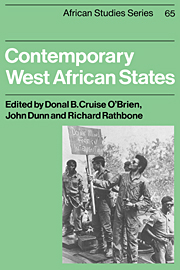8 - Nigeria
Power for profit – class, corporatism, and factionalism in the military
Published online by Cambridge University Press: 10 December 2009
Summary
The ‘new morality’ which has emerged from the military era is such that there is general acceptance among most members of the power elite that power is for profit rather than for responsible exercise of its privileges or for service. This philosophy has resulted … in the privileges of power being used for pillage. The ‘new morality’ encourages and protects chaos because members of the new elite have vested interest in chaos despite its long term danger to social stability and their real or permanent interests.
Report of the Presidential Transition Committee, unpublished, Lagos, September 1983, p. 30.No other official commentary on Nigerian public life captures with such brutal frankness and insight the logic behind political competition in contemporary Nigeria. Even the soldiers who overthrew President Shehu Shagari in December 1983 did not hesitate to adopt as the reform charter of their regime the recommendations of the Transition Report which Shagari himself was avowedly following. The absence of fundamental cleavages amongst Nigeria's political class means that struggle for power is always less concerned with radically competing policies or ideals, than it is with who secures power itself and who controls the disposition of its spoils.
- Type
- Chapter
- Information
- Contemporary West African States , pp. 113 - 144Publisher: Cambridge University PressPrint publication year: 1990

